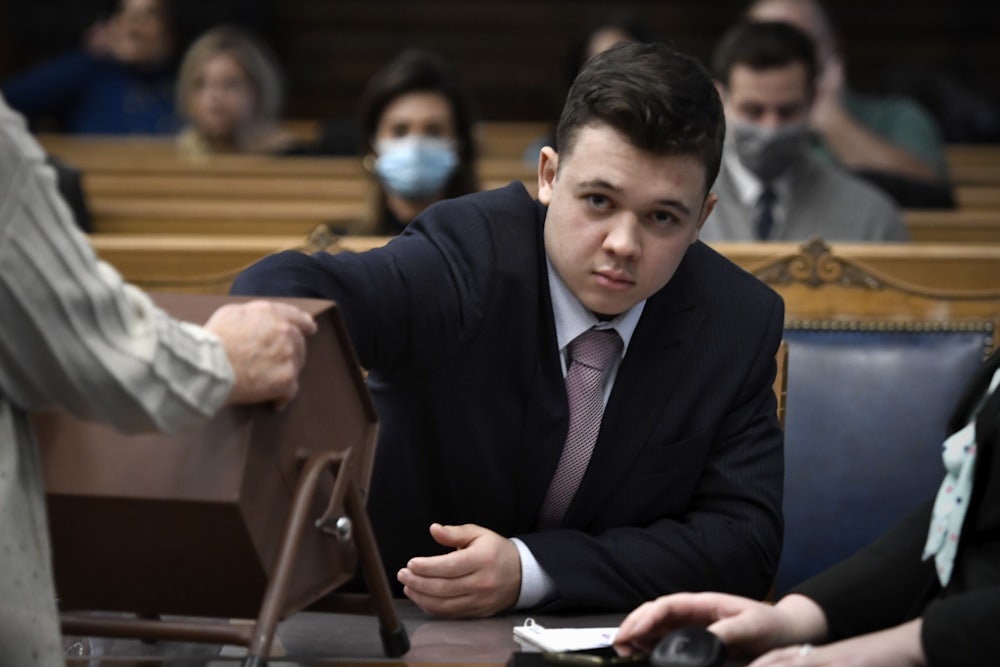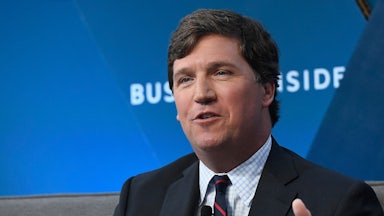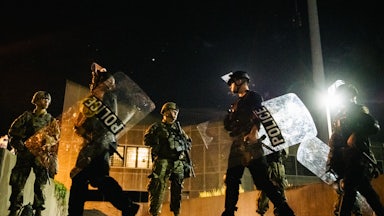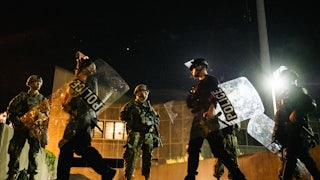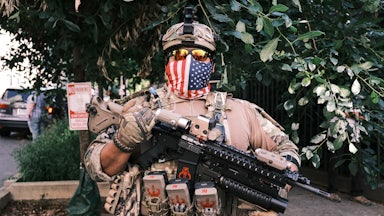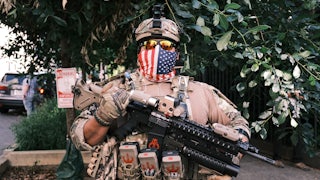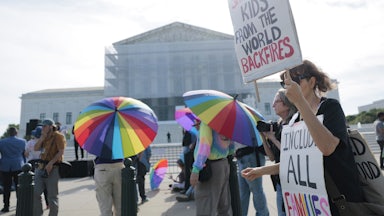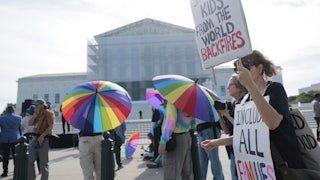In a pair of courtrooms separated by 1,000 or so miles, an 18-year-old former lifeguard and a 35-year-old former member of the Coast Guard argued to predominantly white juries that when they killed people it was because they desperately feared for their own lives. Most every major news outlet is running a live feed dedicated to each minuscule development in Kyle Rittenhouse’s self-defense trial. Oddly, the coverage of the former Coast Guardsman, Travis McMichael; his ex-cop father, Gregory; and their neighbor, William Bryan—the three men accused of murdering Ahmaud Arbery while he was out for a jog in Brunswick, Georgia, in February 2020—hasn’t been nearly comparable in scale.
The idea of a wannabe child soldier like Rittenhouse is obviously potent to onlookers on the left and right, after several years of protests and counterprotests in which militia activity was particularly visible. Immediately following the night Rittenhouse shot three protesters in Kenosha, Wisconsin, killing two of them, the right began to turn Rittenhouse into a symbol of law and order and righteous self-defense. He’s been called an “all-American” and “a little boy trying to protect his community,” his indeed childlike terror and impulsiveness improbably reimagined as the work of a tactical mastermind evading certain death. Recently, the conversation has become so unfixed from reality that an Australian conservative commenter (and frequent New York Post contributor) claimed the case was really brought in order to “punch down at the white working class son of a single mother.”
Obviously there are a number of differences between the Rittenhouse case and that of the men who killed Arbery, but both raise the same fundamental question: Who will the state allow to self-deputize as killer police? The men who chased down Arbery claim they were attempting a “citizen’s arrest” when they suspected a young Black man of burglary. Rittenhouse’s lawyers say their client had been menaced by a “crazy person” who, unless stopped with a bullet, would have certainly killed the then-17-year-old playacting at war. But it’s only Rittenhouse who has been valorized by conservative politicians and commenters, and only Rittenhouse receiving 24-hour coverage as the prosecution and defense argue over which video evidence the jury can view. Whether he goes to prison or not, the project that intended to make him a martyr and a culture-war staple undoubtedly worked.
Rittenhouse isn’t the first assailant to get this celebrity treatment, but it is notable that the right wing has adopted a teenager as a symbol of justice instead of a literal cop and his son (who leaned heavily on his use-of-force training in the Coast Guard in his testimony on Wednesday). After George Zimmerman shot and killed Travyon Martin, he raised hundreds of thousands of dollars for his legal defense and signed autographs for fans. As recently as last year, Jake Gardner, a bar owner who shot and killed a Black man during a Black Lives Matter event, was described by conservative commentators as a righteous small businessman responding to an imminent threat. And even the personal injury lawyer Mark McCloskey, a bumbling figure with a rather poor grasp of gun safety, has parlayed his fear of protesters into a political career. But the men who killed Arbery, one of whom was a police officer for decades, haven’t really been admitted into this pantheon. A smattering of Facebook groups and short-lived GoFundMe campaigns quickly fell off.
The prosecution of the Arbery shooting has been more complex—and arguably more reflective of the routine reality of state-sanctioned violence in the United States. It took two and a half arduous months to make an arrest. The New York Times noted in early coverage that witnesses said the jogging Arbery looked like he was “up to no good,” playing into a long history of casting Black men as criminals worthy of killing. The first prosecutor to take the case allegedly directed officers to let Travis McMichael walk away, as a way of showing favor to his father, her former employee; the second prosecutor argued that there was no probable cause to issue warrants because it is “perfectly legal” in Georgia to “hold this criminal suspect until law enforcement arrived,” as the men who stopped Arbery did. All of which is probably a better representation of how people tend to get away with murder than, for instance, the highly publicized Wisconsin-specific legal technicality by which Rittenhouse got out of his possession of a dangerous weapon charge.
The judge’s conduct in the Rittenhouse case has also offered more cinematic clarity about state bias: Judge Bruce Schroeder banned the use of the word “victim” and encouraged the jury to applaud for one of the defense’s witnesses on Veteran’s Day; and when his phone rang in the courtroom, the ringtone was, quite darkly, a popular Donald Trump campaign song. In the final days of the trial, he allowed the teenager himself to draw slips of paper out of a raffle drum to determine which of the 18 jurors would participate in securing his imprisonment or release.
All these obvious displays of bias—and the mental gymnastics required to make Rittenhouse a hero—mask another set of truths. Rittenhouse was an attractive example of vigilante justice for the right because the people he shot were white, and because one hit him with a skateboard, and because his actions could be laundered through a wider set of implicitly racialized culture-war staples like “rioters” and “the mob”; his supporters may take faith in the fact that many prosecutors and judges have deep biases not betrayed by the sounds their cell phones make. And while much of the country will be outraged by Rittenhouse’s acquittal should it come, there is a particular set of ahistorical assumptions also underlying the widespread horror at this teenage shooter. The concern is that it will set a precedent, that if Rittenhouse is allowed to get away with murder, he’ll send a message that white men can just grab a gun and shoot anyone they perceive as a threat. But doesn’t that kind of thing already happen all the time, without all the conservative bluster and the national press? It wasn’t like Gregory and Travis McMichael needed a figure like Rittenhouse to tell them they could play cop and very nearly walk free.
